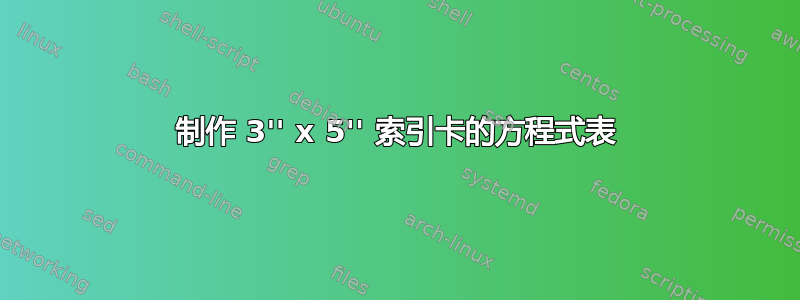
正如标题所述,我正在尝试用 LaTeX 制作一张 3"x5" 索引卡的小抄。我使用 LaTeX,这样我就可以得到非常小的字体并尽可能地容纳更多内容。我见过的抽认卡包只有正面和背面的记事卡,不一定是为方程式制作的。我还尝试制作一个尺寸为 3x5 的迷你页面,但文本似乎也不符合要求。我决定采用以下方法,但这是一个非常混乱的解决方案
\documentclass[10pt]{book}
\usepackage[width=5in, height=3in]{geometry}
\usepackage{amsmath, amsfonts, amssymb}
\usepackage{physics}
\usepackage{lipsum}
\usepackage{multicol}
\pagestyle{empty}
\newcommand{unit}[1]{\mathrm{#1}}
\newcommand{\E}[2]{\times10^{#1}\,\unit{#2}}
\begin{document}
\begin{multicols}{3}
$\begin{aligned}
m_c&=9.11\E{-31}{Kg}\\
m_p&=1.67\E{-27}{Kg}\\
\mathrm{e}&=1.60\E{-19}{C}\\
\epsilon_0&=8.85\times10^{-19}\flatfrac{\unit C^2}{\unit N\cdot\unit m^2}\\
k_0&=8.99\times10^9\flatfrac{\unit N\cdot\unit m^2}{\unit C^2}\\
F&=k\frac{Q_1Q_2}{r^2}\\
\oint&\vec{E}\cdot\,\dd\vec{A}=\frac{Q}{\epsilon_0}\\
F&=qE\\
x&=v_0t+\frac12at^2\\
a&=\frac{v_f^2-v_0^2}{2x}\\
p&=\ell Q
\end{aligned}\\
\begin{aligned}
F&=qvB\sin\theta\\
V&=\ell vB\sin\theta\,\mathrm{(emf)}\\
\flatfrac{N_1}{N_2}&=\flatfrac{V_1}{V_2}\\
\end{aligned}$
\lipsum[1-2]
\end{multicols}
\end{document}
对于任何粗心的代码,我深表歉意,我的问题是对齐或对齐*中的方程式不会自动转到多列中的下一列,并且间距不正确。我的另一个问题是,按照我的方式更改边距会导致卡片只有一侧出现在一页上。我想知道是否有办法制作这个方程式表,使我的所有等号在 3 列或更多列中对齐并正确间隔。单位和其余文本的重叠也不太好看。
答案1
也许这能有所帮助:
如果所有内容只能放在一页纸中,您可以使用 tcolorbox 中的海报:
\documentclass[10pt]{book}
\usepackage[width=5in, height=3in]{geometry}
\usepackage{amsmath, amsfonts, amssymb}
\usepackage{physics}
\usepackage{lipsum}
\usepackage{multicol}
\pagestyle{empty}
\newcommand{\unit}[1]{\mathrm{#1}}
\newcommand{\E}[2]{\times10^{#1}\,\unit{#2}}
\usepackage{tcolorbox}
\tcbuselibrary{poster}
\begin{document}
\begin{tcbposter}[
poster = {%showframe,
columns=3,
rows=1,
spacing=1mm,
},
]
\posterbox[
top=1pt,
bottom=1pt,
left=1pt,
right=1pt,
tile,
colback=white,
]{
name=Col,
sequence = 1 between top and bottom then
2 between top and bottom then
3 between top and bottom,
}{
\footnotesize
$\begin{aligned}
m_c&=9.11\E{-31}{Kg}\\
m_p&=1.67\E{-27}{Kg}\\
\mathrm{e}&=1.60\E{-19}{C}\\
\epsilon_0&=8.85\times10^{-19}\flatfrac{\unit C^2}{\unit N\cdot\unit m^2}\\
k_0&=8.99\times10^9\flatfrac{\unit N\cdot\unit m^2}{\unit C^2}\\
F&=k\frac{Q_1Q_2}{r^2}\\
\oint&\vec{E}\cdot\,\dd\vec{A}=\frac{Q}{\epsilon_0}\\
F&=qE\\
x&=v_0t+\frac12at^2\\
a&=\frac{v_f^2-v_0^2}{2x}\\
p&=\ell Q
F&=qvB\sin\theta\\
V&=\ell vB\sin\theta\,\mathrm{(emf)}\\
\end{aligned}$
$\flatfrac{N_1}{N_2}&=\flatfrac{V_1}{V_2}\\$
\lipsum[1-2]
}
\end{tcbposter}
\end{document}
笔记:我从对齐块中删除了方程式$\flatfrac{N_1}{N_2}&=\flatfrac{V_1}{V_2}\\$,以防止介电常数溢出。但如果您将字体大小减小到 \scriptnote 并将间距增加到 6mm,则可以得到以下结果:
\documentclass[10pt]{book}
\usepackage[width=5in, height=3in]{geometry}
\usepackage{amsmath, amsfonts, amssymb}
\usepackage{physics}
\usepackage{lipsum}
\usepackage{multicol}
\pagestyle{empty}
\newcommand{\unit}[1]{\mathrm{#1}}
\newcommand{\E}[2]{\times10^{#1}\,\unit{#2}}
\usepackage{tcolorbox}
\tcbuselibrary{poster}
\begin{document}
\begin{tcbposter}[
poster = {%showframe,
columns=3,
rows=1,
spacing=6mm,
},
]
\posterbox[
top=1pt,
bottom=1pt,
left=1pt,
right=1pt,
tile,
colback=white,
]{
name=Col,
sequence = 1 between top and bottom then
2 between top and bottom then
3 between top and bottom,
}{
\scriptsize
$\begin{aligned}
m_c&=9.11\E{-31}{Kg}\\
m_p&=1.67\E{-27}{Kg}\\
\mathrm{e}&=1.60\E{-19}{C}\\
\epsilon_0&=8.85\times10^{-19}\flatfrac{\unit C^2}{\unit N\cdot\unit m^2}\\
k_0&=8.99\times10^9\flatfrac{\unit N\cdot\unit m^2}{\unit C^2}\\
F&=k\frac{Q_1Q_2}{r^2}\\
\oint&\vec{E}\cdot\,\dd\vec{A}=\frac{Q}{\epsilon_0}\\
F&=qE\\
x&=v_0t+\frac12at^2\\
a&=\frac{v_f^2-v_0^2}{2x}\\
p&=\ell Q
F&=qvB\sin\theta\\
V&=\ell vB\sin\theta\,\mathrm{(emf)}\\
\flatfrac{N_1}{N_2}&=\flatfrac{V_1}{V_2}\\
\end{aligned}$
\lipsum[1-2]
}
\end{tcbposter}
\end{document}
如果不是这种情况,您应该考虑在示例中将字体大小减小到 \scriptsize。





